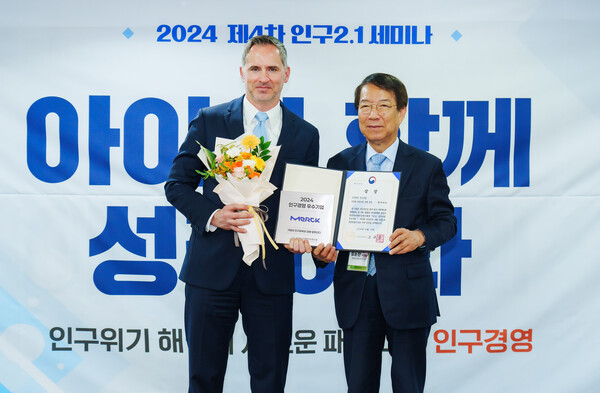Merck Biopharma Korea said it received the Minister of Health and Welfare Award during the "2024 Fourth Population 2.1 Seminar" held on Tuesday at the Korea Press Center in Seoul. The event was jointly organized by the Korean Peninsula Population Institute for Future (KPPIF) and the Seoul Metropolitan Government.

The award ceremony aims to recognize and promote companies that are leading initiatives in addressing low birth rates. Through identifying exemplary corporate practices, the event seeks to explore and advance the role of businesses in revitalizing the population growth rate.
Merck Biopharma Korea received the Ministerial Award for its efforts in supporting work-family balance and fostering a family-friendly corporate culture. The company’s initiatives to assist employees with infertility treatments and flexible parental leave were acknowledged as contributing factors.
To recognize corporate responsibility in addressing the national demographic crisis, KPPIF evaluated 300 local companies based on its “EPG (Environment, Population, Governance) Management” criteria. Five categories of awards were presented, including Excellent Parental Time Support, Robust Childbirth Support, Parental Co-Care Support, and Comprehensive Excellence Awards.
“Merck Biopharma Korea’s flexible working arrangement participation rates and maternity and parental leave usage are exceptionally high among both men and women,” Merck Biopharma Korea General Manager Christoph Hamann said. “This year, we introduced the ‘Fertility Benefit Program,’ which covers treatment costs for employees pursuing fertility solutions.”
The company remains committed to supplying cutting-edge infertility treatments such as Gonal-F and Pergoveris, as well as pursuing activities to address Korea’s declining birth rate, Hamann added.
Hamann elaborated on the critical role businesses play in addressing the country’s declining birth rate.
“If birth rates continue to fall, the workforce will shrink, which will eventually impact talent acquisition and regional economic growth,” he said. “Despite the recent expansion of parental leave and childcare support systems, a supportive corporate atmosphere where these benefits can be freely utilized is essential for addressing low birth rates.”
Related articles
- Merck presents RWE study of multiple sclerosis drug Mavenclad in Koreans
- Merck Biopharma's Bavencio changes urothelial carcinoma treatment paradigm in Korea
- Tepmetko offers potential follow-up cure for Tagrisso-resistant lung cancer patients
- 'Bavencio improved progression-free survival in Korean urothelial carcinoma patients'
- GC Cell, Artiva, MSD ink licensing deal for CAR-NK therapy development
- [Interview] Merck's partnership with KAIST powers Korea's vision for global leadership in life sciences
- Merck Korea and LG Chem to co-promote type-2 diabetes drugs in Korea
- Merck Biopharma continues to provide innovative treatments to Korean patients despite external headwinds: GM
- ‘Merck, the oldest pharma company, leads innovation, standard of care’
- Merck Biopharma Korea promotes gender equality and work-life balance on Women's Day

